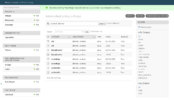As of the following commit today, the checking of allowed IP addresses has moved away from simple string comparisons to use the python ipaddress module.
https://github.com/djangopbx/djangopbx/commit/5eb6649337baefa8c6d4e6a51e750eda4719e004
This is a breaking change because single IP addresses must now also contain the subnet bits. So a single IPv4 address will require a /32 appending and a single IPv6 will require a /128 appending. This now follows the same pattern as the FreeSWITCH ACL
The big advantage of this is that we can now specify a network as an allowed address range, for example 192.168.1.0/24.
New installs are not affected, but if you are upgrading you will need to update the allowed_address entries in Default Settings. See the screenshot below:

https://github.com/djangopbx/djangopbx/commit/5eb6649337baefa8c6d4e6a51e750eda4719e004
This is a breaking change because single IP addresses must now also contain the subnet bits. So a single IPv4 address will require a /32 appending and a single IPv6 will require a /128 appending. This now follows the same pattern as the FreeSWITCH ACL
The big advantage of this is that we can now specify a network as an allowed address range, for example 192.168.1.0/24.
New installs are not affected, but if you are upgrading you will need to update the allowed_address entries in Default Settings. See the screenshot below:


